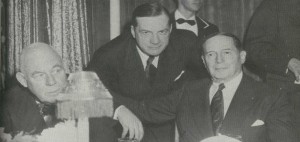The Foundation has a rich history with many of our nation’s leaders having lent their name and personal fortunes to building its legacy, and the organization’s future appears bright. Archie Manning, a true humanitarian and a member of the College Football Hall of Fame from Ole Miss, serves as the current chairman, and Steven J. Hatchell, the former commissioner of the Big 12 and Southwest conferences and executive director of the FedEx Orange Bowl, serves as the current president & CEO.
Twenty-Seven corporate CEOs currently participate as members of the board or in an emeritus capacity. Ten athletics directors serve alongside two conference commissioners, and the executive directors of the National Association of Collegiate Directors of Athletics (NACDA) and the American Football Coaches Association (AFCA). Ten members of the College Football Hall of Earner hold positions on the board as well as a filmmaker, a national broadcaster, and the former Texas Secretary of State.
In the official book of the National Football Foundation, a 564-page tome published in 1972, Hall of Fame Coach Bud Wilkinson wrote about the high value placed on the game and its ability to keep us young, vibrant and “steamed up.” He also noted the Foundation’s role in highlighting the sports contributions to our free society and its ability to produce a cross-section of the captains of industry, business, finance, statesmanship, judiciary and education.
“On each Saturday of each fall, we find caravans of millions of college alumni journeying back to their alma maters to watch their favorite teams play There they renew old acquaintances and friendships. There they thrill from the nostalgia of their earlier years as they watch the colorful marching bands, the majorettes, and the cheerleaders urging on their teams. There the bonds are renewed with their colleges, and there have an inspiring demonstration of a vibrant free society at play. To me, there is no sport that has the color, the pageantry and excitement of college football.”
Each year the organization’s leaders gather at the Annual Awards Dinner at the Waldorf-Astoria to extol the sentiments that Wilkinson articulated. This year marks a celebration of the organization’s 63rd Anniversary.
The first Annual Awards Dinner took place at the Hotel Astor on October 28, 1958 with 2,000 people packing the grand ballroom. George Murphy, ex-MGM star and former Yale football player, flew from California to be Master of Ceremonies. The Yale Whiffenpoofs sang. Admiral Torn Hamilton, director of Athletics at Pittsburgh, inducted nine new Hall of Famers, and U.S. President Dwight D. Eisenhower, a West Point football player of ’15, took a break as the 1958 election campaign ended to accept the NFF’s Gold Medal.
“Wherever human liberty is respected, competition is the animator of progress. In football, in business, in politics, in the trades, professions and the arts, the normal urge to excel provides one of the most hopeful assurances that our kind of society will continue to advance and prosper,” said President Eisenhower. “Morale – the will to win, the fighting heart – are the honored hallmarks of the football coach and player, as they are of the enterprising executive, the successful troop leader, the established artist and the dedicated teacher and scientist.”
In setting the standard in Gold Medal speeches, Eisenhower attracted many of the nation’s business elite to the event, including the heads of Firestone Tire, General Dynamics, Coca-Cola, Pan-American Airways and the publisher of the Los Angeles Times. The following year, the event moved to its current home for the past 53 years, the Waldorf-Astoria Hotel, and General Douglas MacArthur accepted the NFF’s Gold Medal with 1,500 people in attendance at the $50 a plate dinner on Dec. 1, 1959.
“Football has become a symbol of our countries best qualities — courage, stamina, and coordinated efficiency Many even believe in these cynical days of doubt and indecision that through this sport we can best keep alive the spirit of reality and enterprise which has made us great,” said MacArthur in touching on the same viewpoint expressed by Eisenhower and Wilkinson “In all my own long public service, both in war and peace, it is the football men that I found my greatest reliance.”
Now in the seventh decade of the National Football Foundation’s history, the importance of the Annual Awards Dinner remains a centerpiece in the organization’s effort to highlight the value of the game while providing a historic venue for more great speeches, which will inspire young men for generations to come.


